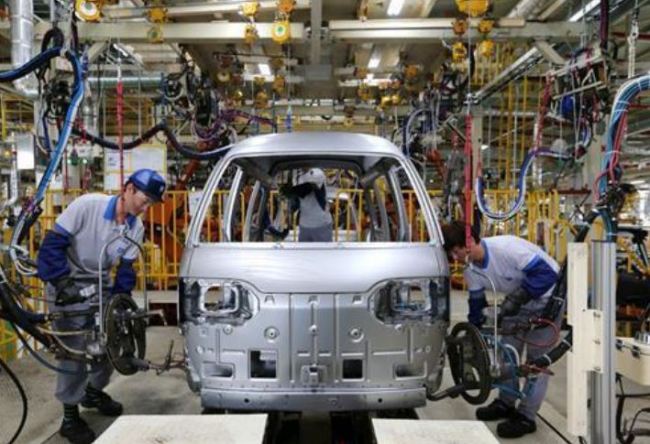Old rumors of GM Korea’s potential pullout from South Korea recently resurfaced, following moves and comments made by the automaker’s global management.
Last week, General Motors International President Barry Engle visited Korea, following a trip last month, although the details of his meetings here were not disclosed. GM CEO Mary Barra, meanwhile, also called Korea a challenge last week during a public conference call with industry analysts, eluding to potential changes and restructuring.
All the while, GM Korea has been stuck in the middle, repeatedly having to deny rumors of market withdrawal, while struggling to mediate between its labor union’s push for raises and the strict demands of its headquarters.

GM Korea workers at the carmaker`s Changwon plant assemble a Damas mini van for sale. (Yonhap)
The recent meetings sparked speculations over the difficulties faced by GM Korea, with some questioning the global automaker’s “ulterior” motives.
According to industry insiders, the obvious downsides of doing business in Korea are rising labor costs, falling domestic sales and high research and development expenses.
GM Korea’s labor union has been calling for pay rises, despite continued poor performance. Sales dropped 12.2 percent year-on-year to 524,547 units last year.
The base wage level of GM Korea employees last year was 350 percent higher than that of 2002, and total labor costs rose more than 50 percent from 2010 to 2015, according to GM Korea.
Last month unionized workers and the company settled wage terms at a 50,000 won rise ($46) in basic monthly salary, a 6 million won lump-sum payment and a 4.5 million won performance bonus, the company said.
This came amid downsizing production at its factory in Gunsan, where operations slid below 20 percent.
After GM’s decision to exit Europe in 2013, factory production had dropped by 200,000 vehicles.
“GM Korea is no longer an attractive production base due to high labor cost dragging down its competitiveness,” said Lee Hang-koo, a senior researcher at the Korea Institute for Industrial Economics & Trade.
Research and development costs are also raising questions over GM’s future.
According to the Financial Supervisory Service, GM Korea spent a total of 614.1 billion won on research and development in 2016, more than its entire operating loss of 521.9 billion won.
The latest events have also fanned news reports suggesting that GM was playing the withdrawal card to negotiate for support from the Seoul government.
During a parliamentary inquiry held last Friday, Vice Finance Minister Ko Hyoung-kwon said “I met with president Barry Engle. GM explained its overall business situation here, future development plans, and requested government cooperation.”
State-run Korea Development Bank, for its part, denied reports that GM had asked for government support to help it increase capital by acquiring newly issued stocks, which would cost some 500 billion won. Korea Development Bank is GM Korea’s second-largest shareholder with a 17.02 percent stake.
Calls are now growing to look more into the automaker’s financial situations.
“Before offering support the government should look into the company’s financial records, which it is refusing to share. GM can pull out of the country as it has done in Australia in the past,” Lee Hang-koo said.
As part of its global restructuring efforts that began in 2013, GM pulled out from Europe and India, and ended vehicle production in Australia and Indonesia.
Korean authorities may inspect the financial records of GM Korea following arguments that GM Korea has paid excessively high interest rates to its headquarters, local reports have said.
GM Korea borrowed 2.4 trillion won with a 5 percent annual interest rate from headquarters in 2013. This had resulted in interest payments of 462 billion won between 2013 and 2016.
Due to its low credit rating, local banks had been reluctant to lend money to GM’s local unit, according to the company.
By Kim Bo-gyung (lisakim425@heraldcorp.com)


![[Herald Interview] 'Amid aging population, Korea to invite more young professionals from overseas'](http://res.heraldm.com/phpwas/restmb_idxmake.php?idx=645&simg=/content/image/2024/04/24/20240424050844_0.jpg&u=20240424200058)



